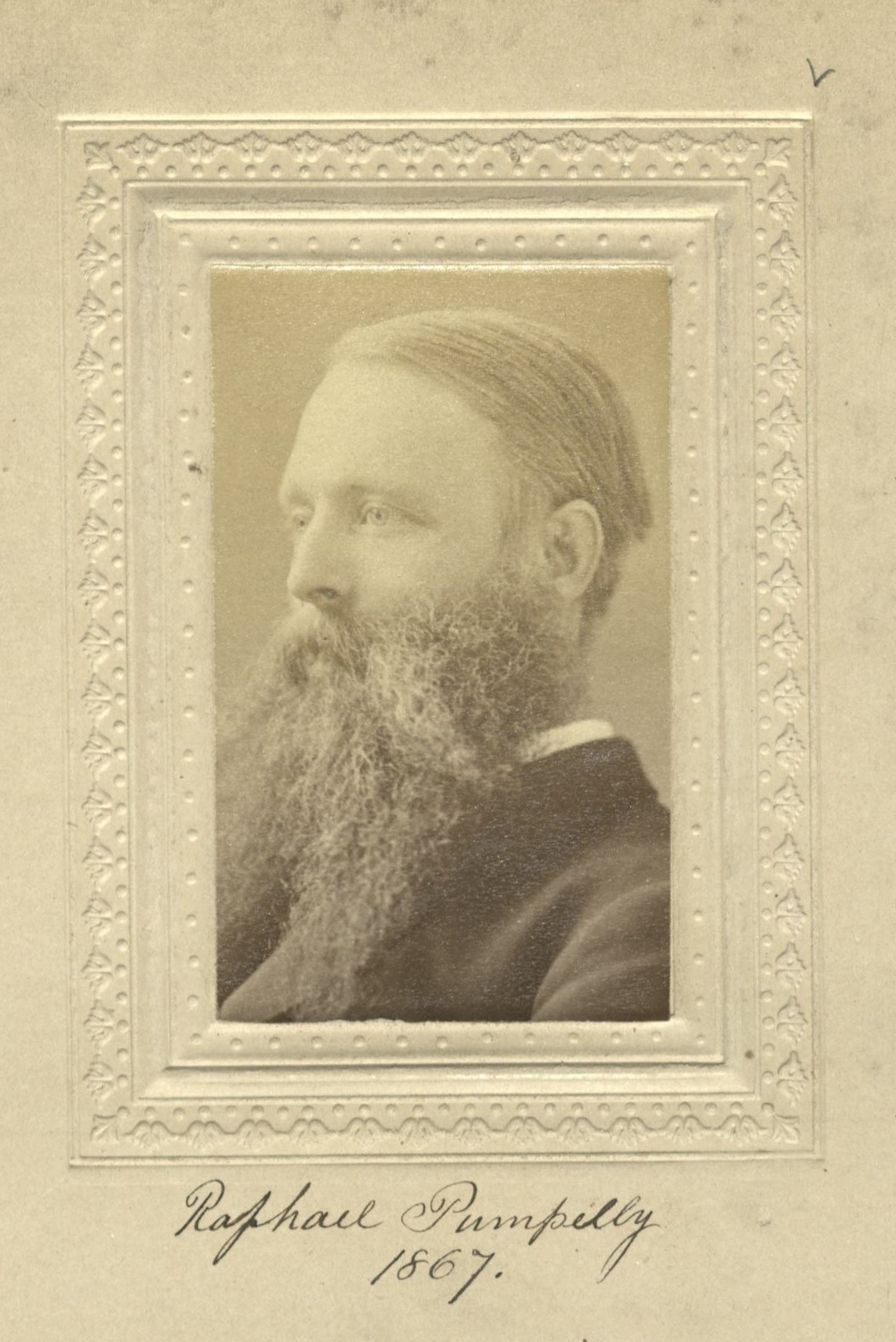Geologist/Explorer
Centurion, 1867–1923
Born 8 September 1837 in Owego, New York
Died 10 August 1923 in Newport, Rhode Island
Buried Berkeley Memorial Cemetery , Middletown, Rhode Island
, Middletown, Rhode Island
Proposed by Lewis M. Rutherfurd and Wolcott Gibbs
Elected 5 October 1867 at age thirty
Archivist’s Note: Father of Raphael W. Pumpelly
Proposer of:
Seconder of:
Century Memorial
Raphael Pumpelly was one of those men whose exploits seem to belong to the Elizabethan age of adventure and discovery. As with those older pioneers, the story of his achievement is colored with his personality. Not least of what may be seen in his book of reminiscence is the alertness of his humorous perception in the midst of stirring adventure. The Paris actress who wept because Pumpelly would not sell his dog to cheer her loneliness and of whom the young engineer concluded only after leaving her that her designs had been on him, not on the dog; his fellow-students at Freiberg who used to carry about with them their eight-inch housekeys for purposes of offense and defense; the Hanover fortune-teller whose warning—“the danger I see is from those with you in strange lands; never let them go behind you”—Pumpelly was unable afterward to disregard; the “mouflon” with the long horns which Pumpelly bought, which refused to adapt itself to indoor conventionalities, upset the Apollo Belvedere, jumped through the kitchen window and devastated the crockery, only to elicit from the landlord the assurance to the frightened natives, “Don’t be excited, it is only this gentleman’s pet lamb!”—this in turn might be the chronicle of an eighteenth century peregrination.
Pumpelly’s profession of mining and geological engineer gave him the opportunity for carrying out his adventurous ideals. His earlier professional work had to do with prospecting for silver in New Mexico. It was at a time when that part of the country was largely under control of the Apaches. In one of Pumpelly’s exploring expeditions, the Apaches cut off and murdered one-half of his expedition, the murdered group being commanded by his nearest friend. He made himself an authority on the selection of timber lands and engaged in various expeditions to the northwest for the account of Eastern investors in locating pine lands. As State Geologist in Missouri, he had a hand in the discovery of the deposits in Iron Mountain. That position he resigned after a brief period; for the reason, it was said, that his report on the resources of the State was denounced as “unpatriotic” in the State Assembly by statesmen in whose counties Pumpelly had not been able to find profitable minerals.
His early work in locating the copper deposits in the Peninsula of Michigan fixed the lines of certain deposits, up to that date the most profitable that had been discovered. The instructions were limited to a specific territory, or Pumpelly might have had the opportunity of bringing into sight the enormously profitable copper ventures of Calumet and Hecla, which adjoined the region that he had been ordered to explore. But Pumpelly remarked, in regard to the past possibility of a $50,000,000 fortune, that it would have been an intolerable worry.
In association with his friends, Pumpelly was a man of quiet manner and even temper. His various campaigns gave evidence, however, of ability to command men and to maintain discipline; there are plenty of instances to show that he could take the reins in hand very firmly when necessity required. With all this, his character was singularly simple. Mr. Holt has told us in his Recollections how, when the natives of Pumpelly’s New Hampshire summer home had helped to save his burning house, Pumpelly offered each of them the choice between five dollars and a copy of his Reminiscences, and all chose the Reminiscences. “He loved all people worth loving,” is the conclusion of his fellow-Centurion, “and all people worth loving loved him.”
Alexander Dana Noyes
1924 Century Association Yearbook

